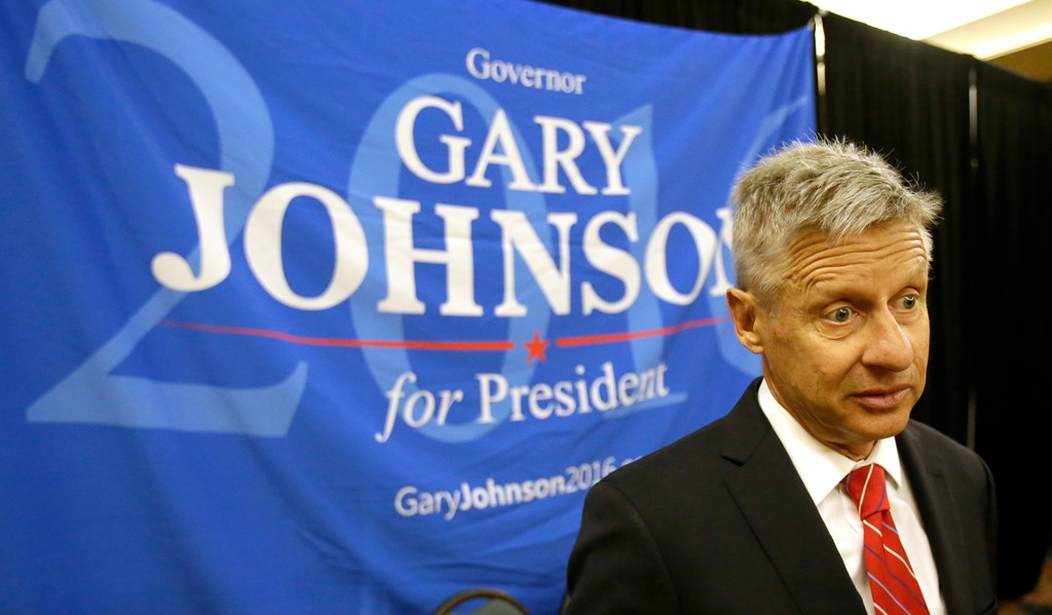In this election, Libertarian Party presidential nominee Gary Johnson and running mate Bill Weld present themselves as the island.
With the two major parties choosing nominees who are viewed more unfavorably than any other nominee in recent history, the Libertarian candidates think they offer a way to escape disaster. Some Americans already agree. In a recent CNN poll against Donald Trump, Hillary Clinton and Green Party candidate Jill Stein, Johnson got 13 percent of the vote.
The two represent a notable departure for the party. In the past, the Libertarians have concentrated on mobilizing true believers, exposing the fundamental misconceptions underlying conventional government policy and educating the public about the virtues of untrammeled free markets. That is a reliable formula for capturing 0.99 percent of the popular vote, as they did in the 2012 presidential election.
This year, the party decided to make an effort to expand its appeal beyond those who want to legalize heroin and sell off the national parks. It nominated a pair of former Republican governors (New Mexico and Massachusetts) who during their time in office showed themselves to be pragmatic problem-solvers with sturdy spines.
Both cut taxes and restrained spending enough to earn A's and B's on fiscal report cards issued by the libertarian Cato Institute, which does not grade on a curve. Both cut the number of state government employees. Both were in favor of charter schools, abortion rights and privatizing some government operations.
Recommended
Faced with a Democratic legislature, Johnson vetoed more than 700 bills. Weld managed to work with a Democratic legislature in pulling the state out of a fiscal crisis and balancing the budget.
They are, in short, seasoned adults who know how to govern -- and in a manner attuned to public sentiment. Johnson won a second term with 55 percent of the vote, Weld with 71 percent.
Their campaign message is not: If Americans listen to us, they may become Libertarians. It is rather, as Johnson put it Tuesday when he and Weld met with the Chicago Tribune editorial board: "Most people are libertarian. It's just that they don't know it."
What he means is that they have a general preference for policies that are fiscally conservative but socially tolerant. Americans are in accord with Libertarians, Johnson has argued, in wanting the government "out of your pocketbook and out of your bedroom."
He and Weld are what you might call kinder, gentler Libertarians. Johnson decries the drug war but says the only drug they advocate legalizing is marijuana -- harder ones being off-limits. They would not have intervened militarily in Iraq, Libya or Syria, but Johnson says, "I don't have any alliances I'd want to end."
"We're right up the middle," asserts Weld. About the most radical ideas they offer are cutting the federal budget by 20 percent and abolishing the departments of Education, Commerce and Housing and Urban Development.
The overall effect of hearing all this is underwhelming, like going to see a Bears-Packers game only to discover they're playing flag football. The impression is probably not accidental or unwanted. What Johnson and Weld plainly aim to do is assure Americans disgusted by Hillary Clinton and Donald Trump that the Libertarian Party offers an honest, proven approach, not a radical experiment.
Harvard's Gregory Mankiw, who served as chairman of President George W. Bush's Council of Economic Advisers, has written that he regards himself as a "libertarian at the margin." He explained, "Given our starting point today, I believe more reliance on individual liberty and less on governmental solutions is usually a step in the right direction, but I often recoil at more radical libertarian positions."
In that sense, Johnson's claim that most Americans are unwitting libertarians is entirely plausible. In principle, at least, they would most likely favor reducing taxes and spending, respecting individual autonomy in matters like marijuana, same-sex marriage and education, and exercising more caution about military intervention abroad. But those inclinations have firm limits, which Johnson doesn't propose to breach.
A couple of pleasant but obscure former governors representing a minor party may sound like an unpromising use of your ballot. Until you remember the alternatives.

























Join the conversation as a VIP Member